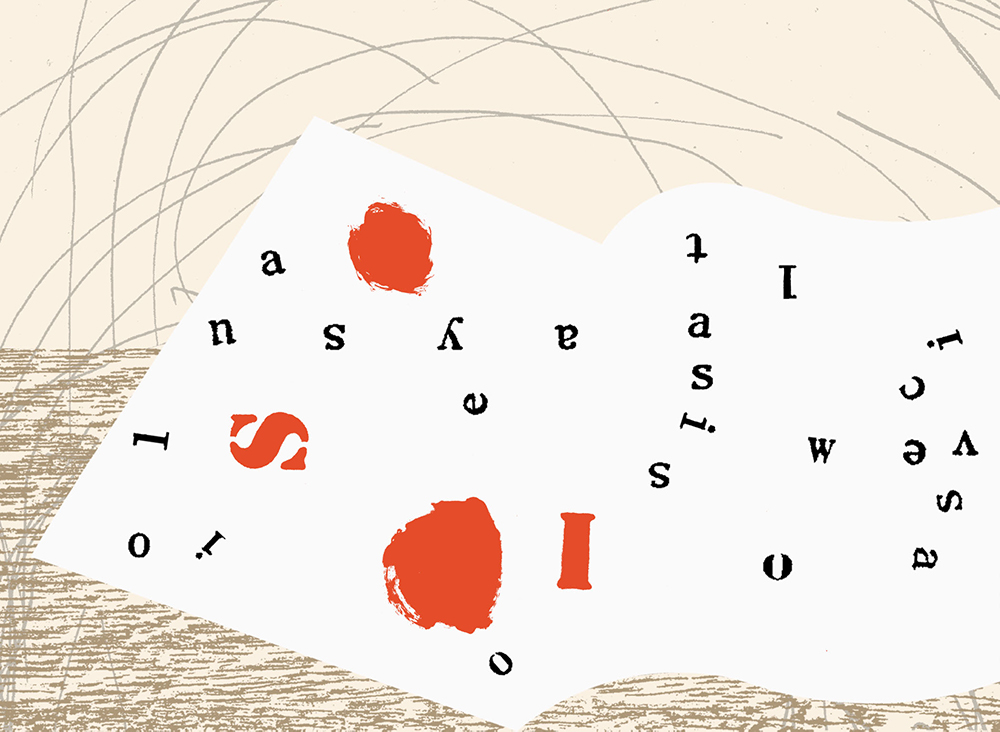I miss crowds. Not the friendly ones, but the strange ones. The ones I could find in New York, on the subway and in the basement of Arlene’s Grocery, where drummers play too loud, where I’m forced to jam up against strangers without fear of infection. Perhaps it took me longer to get to this point than I expected—this lack of familiarity with myself as one in a sea of many.
Now I have more occasions to visit with poetry—more occasions of feeling startled into consciousness. I think back to what the novelist and poet Nick Laird said in March 2020: “In the stream of news the poems sit like stones, lambent under the surface.” They feel this way—weighted and physical in our minds—suggesting a lucidity opposite to our immediate mess.
During the summer of protests, of outrage over inac-tion, it was impossible not to think of Ilya Kaminsky, the Soviet-born poet who later sought asylum in the United States. His 2019 book begins with the poem “We Lived Happily During the War”:
And when they bombed other people’s houses, we
protested
but not enough, we opposed them but not
enough. I was
in my bed, around my bed America
was falling: invisible house by invisible house by invis-
ible house.
I took a chair outside and watched the sun.
In the sixth month
of a disastrous reign in the house of money
in the street of money in the city of money in the country of money,
our great country of money, we (forgive us)
lived happily during the war.
There are ways this pandemic has forced a shift in how we see the world. When we can’t see our moment clearly, we heed the words of writers, bring the tin can to our ears. We step back from our lives, and see that death has always been everywhere, just standing behind a firewall. How can we define this time of pandemic other than through absence? I miss things, people. I miss New York, which I’ve too often criticized, and I am sorry for it. Today, I wonder what lessons we will bring into the new world, if there is a possibility that when we are together again, our perspectives on how to live will have deepened or expanded. Perhaps they already have.
Diaz received her M.F.A. in fiction from Vanderbilt University in 2019. Her work has appeared in Joyland, the Kenyon Review and The Adroit Journal.
Illustration by Lucy Jones
Tomas Tranströmer, “Black Postcards,” translated by Joanna Bankier, from Tomas Tranströmer: Selected Poems, 1954-1986, edited by Robert Hass. Originally published in The Threepenny Review. © 1986 by Joanna Bankier. Used by permission of HarperCollins.
W.S. Merwin, “Provision” from The Essential W.S. Merwin, edited by Michael Wiegers. © 1967 by W.S. Merwin. Reprinted with the permis-sion of The Permissions Co. LLC on behalf of Copper Canyon Press, coppercanyonpress.org.
Ilya Kaminsky, “We Lived Happily During the War,” from Deaf Republic. Originally published in Poetry (May 2009). © 2009, 2018 by Ilya Kamin-sky. Used with the permission of The Permissions Co. LLC on behalf of Graywolf Press, Minneapolis, graywolfpress.org.
